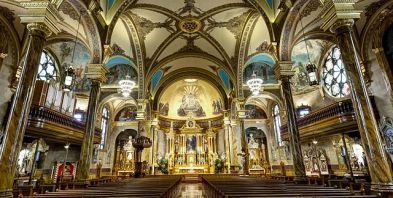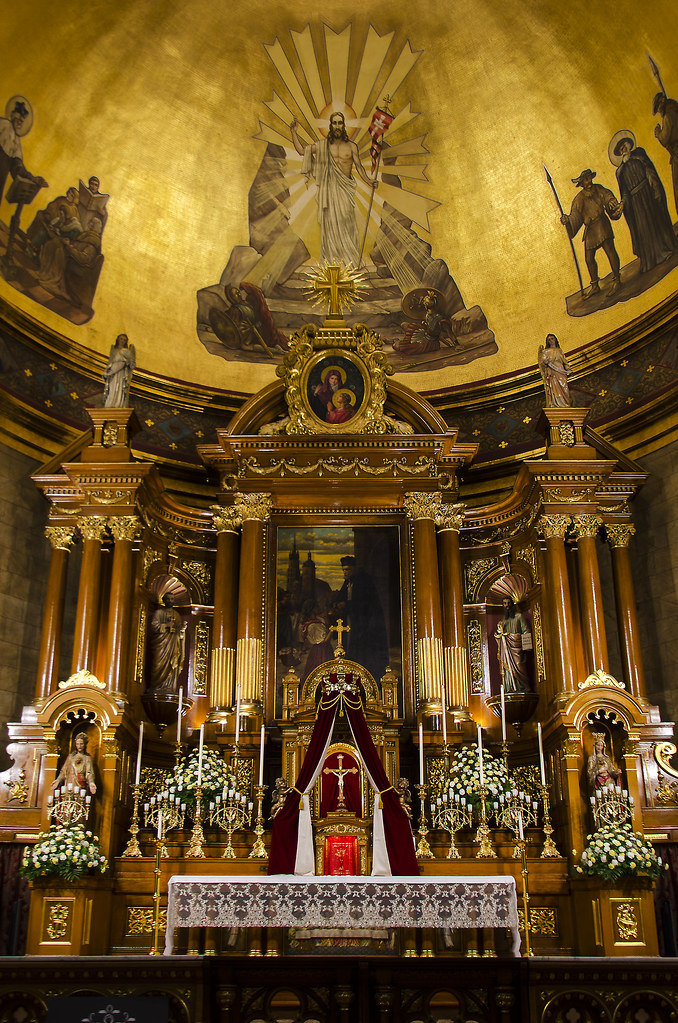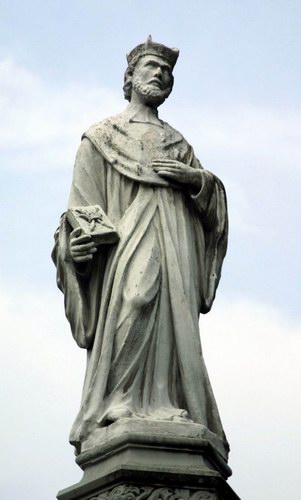
The painting hanging above the Saint John Cantius Church altar in Chicago.
On the northwest side of Chicago, near Milwaukee Avenue and what locals often call the “Polish Triangle” for its strong Polish roots, stands a gorgeous baroque church, known for its traditional liturgies and sacred atmosphere.
Resting amidst the ornately decorated High Altar is a painting of an old man, adorned in scholarly black robes, handing a kneeling girl a jug. In the background, bystanders observe the man and girl, seemingly with awe and wonder, and behind them two princely church steeples overlook the entire scene. Those who have visited Krakow will immediately identify those steeples as belonging to Saint Mary’s Basilica.
Why does this very Polish painting hang above the altar of a Chicago church? Even the name of the church—Saint John Cantius—doesn’t sound particularly Polish. When one learns that it was founded in 1893 by Polish immigrants, however, and that the name John Cantius translates to “Jan Kanty,” the connection becomes clear.
But who was Jan Kanty, why was he so revered, and what’s going on in the altar painting? In the spirit of All Saints’ Day, let’s learn a bit about this Polish Saint.
His Life and Works
Born to a wealthy family in the small Polish town of Kęty, near Auschwitz, in 1390, Kanty was christened after Saint John the Baptist. Little is known of his childhood. Indeed, he first appears in the historical record as a student in Krakow’s famed Jagiellonian University in 1413, where he studied philosophy before entering the priesthood.
After ordination, he spent eight years as rector of a clerical school in Miechów. During this period in history, priests and monks dedicated much time to quiet study, and, most of all, copying manuscripts. In this age before the printing press, the only way to replicate anything, was to manually write it out. Kanty spent many hours of his life copying down Holy Scripture and other theological writings. Today, 18,000 hand-written pages survive, and that’s only believed to be a small fraction of his life’s work.
In 1429, he got a job in the Philosophy Department at Jagiellonian University and worked on earning his doctorate. Soon after, he became director of the school’s Theology Department.
Kanty’s intellectualism was matched only by his piety and dedication to his parishioners and fellow priests. He developed a reputation as a great listener and mentor, and as one who “lived the Gospel.” He rejected material desires, living in a small room and fasting often. In one story, he was hosting a dinner when a beggar entered the room. Kanty rose from his seat shouting “Christ is coming!” and offered his seat to the guest. As a priest, among his holy passions was cultivating the Sacrament of the Eucharist and encouraging the faithful to adore and partake in it.
The Miracle of the Jug
One of the most famous stories surrounding Kanty is the supposed “Miracle of the Jug,” depicted in the painting hanging above the altar in Chicago’s Saint John Cantius Church.

Saint John Cantius Church in Chicago
In June of 1464, an elderly Kanty was walking through the market square in Krakow when he observed a weeping girl with a broken jar. It was a servant girl who had been carrying a jug of milk for her stern mistress when she had dropped and broken it. She was crying for fear of punishment. Moved with compassion, Kanty took the broken jar from the girl’s trembling hands and prayed upon it. Miraculously, when he fitted the pieces together, they remained whole and the jug was fixed! He then told the girl to fill the jug with water from a nearby spring. When she did so, Kanty again took the jug and prayed upon it. When he returned it to the girl, the water inside had turned to milk.
Other miraculous tales surround Kanty. In one, as he was walking the streets of Krakow on a cold winter’s night, he saw a beggar freezing on the roadside. Without thinking, Kanty threw his robe over the shivering man. Later, when he arrived home, he found the same robe back in his room. Had the beggar been Christ in disguise?
Kanty died on Christmas Eve in 1473 and was interred in Jagiellonian University’s Collegiate Church of Saint Anne. In 1767, he was canonized a Saint by Pope Clement XIII. Today, he remains a very popular Polish Saint, in the same league as Saint Maximilian Kolbe and Saint Pope John Paul II. His feast day is typically celebrated on October 20.
Click here to check out the website of Saint John Cantius Church in Chicago.
For Polish readers, click here to check out more information about Saint John Cantius.



